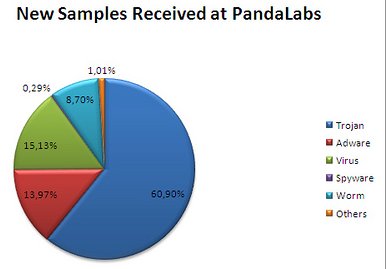
Posted on Saturday, April 10 2010 @ 8:10 CEST by Thomas De Maesschalck
PandaLabs issued a report analyzing the IT security events and incidents of the first quarter of the year, it can be read
over here. The company reports banker Trojans accounted for 60.9 percent of all new malware, and also noticed traditional viruses have made a comeback after showing a dramatic decrease in recent years.
As forecasted by PandaLabs, the amount of new malware in circulation has continued to increase at a record pace. In this first quarter, the most prevalent category was once again banker Trojans, accounting for 61 percent of all new malware. Interestingly, the second most prevalent type was traditional viruses, comprising more than 15 percent of all malware, despite having shown a dramatic decrease in recent years.
“The growing prevalence of banker Trojans signals to us that online accounts for both consumers and businesses continue to be increasingly attractive financial targets for cybercriminals,” said Sean-Paul Correll, threat researcher at PandaLabs. “In addition, the widespread availability of DIY kits online has spurred new, less technical individuals into the cybercrime business as evidenced by the Mariposa case. The simultaneous growth in traditional virus activity is an interesting trend and we suspect this means that cybercriminals are attempting to draw the attention of anti-virus laboratories away from other seemingly more harmful threats.”
In other areas of IT security, botnets have seen considerable activity in 2010. For example, Panda Security played a key role in dismantling Mariposa, one of the largest botnets known to date, and subsequently detected Mariposa malware on Vodafone devices. Mariposa stole account information for social media sites and other online e-mail services, usernames and passwords, banking credentials and credit card data through infiltrating an estimated 12.7 million compromised personal, corporate, government and university IP addresses in more than 190 countries. The botnet was shut down and rendered inactive on December 23rd, 2009, thanks to the collaborative effort of different security experts and law enforcement, including Panda Security, Defence Intelligence, the FBI and Spanish Guardia Civil.
In addition, popular online search topics, including Apple’s iPad and Facebook applications, were once again used in BlackHat SEO attacks. Similarly, cybercriminals continue to use social networks to distribute malware, a trend that saw a considerable uptick in 2009 and will continue throughout 2010.

